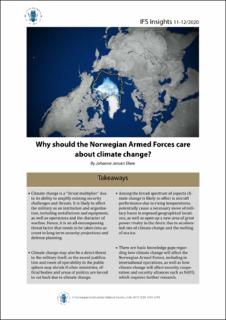| dc.description.abstract | • Climate change is a “threat multiplier” due to its ability to amplify existing security challenges and threats. It is likely to affect the military as an institution and organization, including installations and equipment, as well as operations and the character of warfare. Hence, it is an all-encompassing threat factor that needs to be taken into account in long-term security projections and defense planning.
• Climate change may also be a direct threat to the military itself, as the moral justification and room of operability in the public sphere may shrink if other ministries, official bodies and areas of politics are forced to cut back due to climate change.
• Among the broad spectrum of aspects climate change is likely to affect is aircraft performance due to rising temperatures, potentially cause a necessary move of military bases in exposed geographical locations, as well as open up a new area of great power rivalry in the Arctic due to accelerated rate of climate change and the melting of sea ice.
• There are basic knowledge gaps regarding how climate change will affect the Norwegian Armed Forces, including in international operations, as well as how climate change will affect security cooperation and security alliances such as NATO, which requires further research. | en_US |
